标签:contacts roc ram hash parameter round make ati strong
We implemented a distributed file system using a quorum based protocol. The basic idea of this protocol is that the clients need to obtain permission from multiple servers before either reading or writing a file to the server. Using this system, multiple clients can share files together. The whole system is composed of 1 coordinator (also a server), 1 or more clients, and several other nodes.
Our system also supports multiple reads on the same file.
Multiple writes or read+writes to the same file is not allowed.
Writes to a single file is processed in the order of request sequence.
The client can write (update) files in the file system, or read files. If there is no corresponding filename on the file system, the client will see an appropriate error message.
The nodes will contain replicas of the files and listen to requests from the clients. When a node wants to join the file system, it contacts the coordinator using Thrift. The coordinator will then add it to the server list. A file server which gets a request from the client will contact the coordinator to carry out the operation. That is, any servers can receive read/write requests from users and they will forward the requests to the coordinator.
The coordinator could listen to requests from the servers, and record the information whether a file is free, being read/ written/ synchronizing. The coordinator will build the quorum and then contact the other randomly chosen servers needed for the quorum to complete the operation requested by the server node. The coordinator will be well known to all file servers.
We made these assumptions in this system:
• Assume all the files are text file only and ignore its encoding-format.
• The number of files you need to handle will be small (< 10).
• Servers know other servers’ and coordinator’s information (IP and port).
• The file contents will be very simple (e.g., a file name with version number).
• The coordinator will hold a lock for each file.
• Accessing different files should is done concurrently.
• The system works on the CSELabs machines (separate machines), e.g., KH 4-250 (csel-kh4250-xx.cselabs.umn.edu).
1.3.1 Common part
In the common part, we defined a Thrift struct Address, which is used to describe a node (IP, port).
1.3.2 Coordinator
To initiate the supernode, input java -cp ".:/usr/local/Thrift/*" Coordinator Port NR NW, for example, “java -cp ".:/usr/local/Thrift/*" Coordinator 9090 4 4”.
The coordinator implements the following methods:
1. String Coord_Read(String filename): When a node wants to read a file, it sends the read request to the coordinator by this method. The coordinator will check whether the file can be read first (not being written). If could, the coordinator will build a quorum with NR servers. The coordinator then asks these servers to read files and pick the latest version to get it back to the server.
2. boolean Coord_Write(String filename, String fileContent): When a node wants to write a file, it sends the write request to the coordinator by this method. The coordinator will check whether the file can be written first (not being written or read). If could, the coordinator will build a quorum with NW servers. The coordinator then asks these servers to update the files.
3. void sync(): This is the background synchronization function. It updates all the files to the latest version every 5 seconds. When the file is not being processed, the synchronization function will get the latest version from all the server and then distribute it to all server nodes.
4. ConcurrentHashMap<String, Integer> Coord_lsDir(): this function return all the files in the system and its version number.
5. boolean Join(Address server): The server node calls this function to notify the coordinator to join the file system.
6. boolean reset(int NR, int NW): The function is used to reset the value of NR and NW.
1.3.3 Client
The client is the user interface. It will connect to an arbitrary node.
To initiate it, input “java -cp ".:/usr/local/Thrift/*" Client <nodeIP> <nodePort>”, for example, “java -cp ".:/usr/local/Thrift/*" Client cuda02 7625”.
The client could handle the following operations:
<setdir> local_dirname : Set the local working directory
<getdir> : Show the local working directory. The default working directory is ./ClientDir/
<read> remote_filename : Read a remote file. The client will call read() function on server.
<write> remote_filename local_filename : Write a remote file with the content of a local file. The client will call write() function on server.
<lsremote> : Show the list of all remote files (filename and its version) on the file system. The client will call lsDir() function on server.
<lslocal> : Show the list of all local files in working directory.
<bench-write> : Perform a benchmark: write all files in local working directory to remote file system.
<bench-read> : Perform a benchmark: read all files in remote file system.
<benchmark> tw tr : Perform a benchmark: tw times of [bench-write], then tr times of [bench-read].
<setcod> nr nw : set NR / NW on coordinator. The client will call Coord_reset() function on server.
<quit> : Quit
1.3.4 Node
The nodes will contain replicas of the files and listen to requests from the clients. The working dir of the node is ./ServerDir_xxxxx (xxxxx is a random number to ensure that the working dir is always empty when every time starting the node).
To initiate the node, input “java -cp ".:/usr/local/Thrift/*" Node <coordinatorIP> <coordinatorPort> <nodePort>”, for example, “java -cp ".:/usr/local/Thrift/*" Node csel-kh1250-02 9090 7625”.
The node implements the following methods:
string Read(1: string FileName): client call Read() to read a file. It will call Coord_read() on coordinator.
i32 Write(1: string FileName, 2: string FileContent): client call Write() to write a file. It will call Coord_write() on coordinator.
map<string,i32> lsDir(): client call Write() to write a file. It will call Coord_lsDir() on coordinator.
i32 GetVersion(1: string FileName): coordinator call this to get the version of file on this server. It will return the local version of the specific local file. Return -1 if the file does not exist.
string DirectRead(1: string FileName): a coordinator call DirectRead() to read file. It will return the local content of the specific local file. Return “NULL” if the file does not exist.
i32 DirectWrite(1: string FileName, 2: string FileContent, 3: i32 FileNewVer): a coordinator call DirectWrite() to write file. It will write the file on local server, and set its version to FileNewVer.
bool Coord_reset(1: i32 nr, 2: i32 nw): client call Coord_reset() to reset parameters on coordinator. It will call reset on coordinator.
2.1 How to compile
We have written a make script to compile the whole project.
cd pa3/src
./make.sh
2.2 How to run the project
1. Run Coordinator cd pa3/src/ java -cp ".:/usr/local/Thrift/*" Coordinator Port NR NW <Port>: The port of super <NR>: quorum size for read operation <NW>: quorum size for write operation Eg: java -cp ".:/usr/local/Thrift/*" Coordinator 9090 4 4 2. Run compute node Start compute node on 7different machines. cd pa2/src/ java -cp ".:/usr/local/Thrift/*" Node <coordinatorIP> <coordinatorPort> <nodePort> <coordinatorIP>: The ip address of coordinator <coordinatorPort>: The port of coordinator <NodePort>: The port of node Eg: java -cp ".:/usr/local/Thrift/*" Node csel-kh1250-02 9090 7625 3. Run client cd pa2/src/ java -cp ".:/usr/local/Thrift/*" Client <nodeIP> <nodePort> <nodeIP>: The ip address of node <nodePort>: The port of node E.g: java -cp ".:/usr/local/Thrift/*" Client cuda02 7625
Sample operations on client:
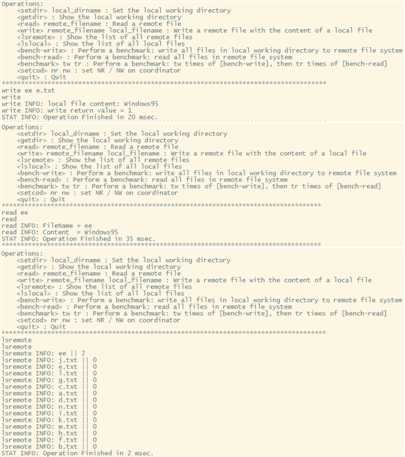
2.3 What will happen after running
The results and log (operation return, succeed flag, time spent, synchronization condition, file version) will be output on the screen. You will be asked to input the next command.
Machines:
We use 10 machines to perform the test, including 1 coordinator machine (csel-kh1250-01), 6 server machines (csel-kh4250-03, csel-kh4250-01, csel-kh4250-22, csel-kh4250-25, csel-kh4250-34), 3 client machines (csel-kh1250-03).
Test Set:
We use a test set (./ClientDir) including 10 items, totally 314 bytes. The data uses a shared directory via NSF.
Logging:
Logging (operation return, succeed flag, time spent, synchronization condition, file version) is output on the window.
Testing Settings:
We test:
3 clients
read-heavy/ write-heavy workloads
small/big value of NR/NW
3.2 read/write mixed (300 read, 100 read for each client, 300 write, 100 write for each client)
Unit: ms
1)NR = 4, NW = 4
Client 1, read time: 812, write time: 2007
Client 2, read time: 817 , write time: 1876
Client 3, read time: 809, write time: 1796
2)NR = 1, NW = 7
Client 1, read time: 531, write time: 2970
Client 2, read time: 565, write time: 3276
Client 3, read time: 706 , write time: 3606
3)NR = 7, NW = 7
Client 1, read time: 1081, write time: 2754
Client 2, read time: 774, write time: 2854
Client 3, read time: 644, write time: 2875
4)NR = 7, NW = 4
Client 1, read time: 802, write time: 1822
Client 2, read time: 946, write time: 1820
Client 3, read time: 1031, write time: 2225
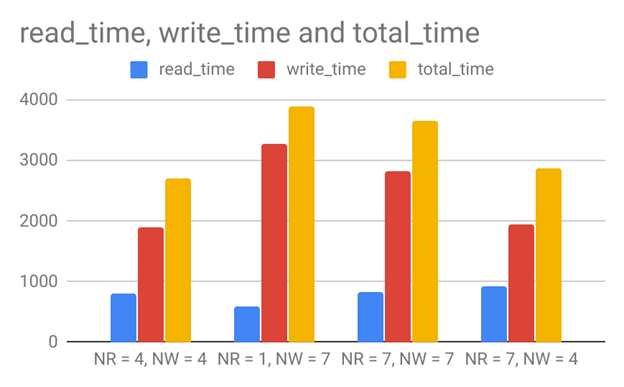
When NR=1, the read time is the shortest. When NW=4, the write time is the shortest. NR = 4, NW = 4 reach the shortest total time. Maybe that’s because the size of the quorum is small, less time were spent in distributing updates to quorum and collect the latest version from Quorum. Also, we found that the time spent on single write operation is much longer than a single read operation.
3.3 write heavy (120 read, 40 read for each client, 480 write, 160 write for each client)
1)NR = 4, NW = 4
Client 1, read time: 284, write time: 2693
Client 2, read time: 228, write time: 2693
Client 3, read time: 262, write time: 2629
2)NR = 1, NW = 7
Client 1, read time: 180, write time: 4052
Client 2, read time: 248, write time: 4083
Client 3, read time: 266, write time: 4117
3)NR = 7, NW = 7
Client 1, read time: 310, write time: 4961
Client 2, read time: 453, write time: 4793
Client 3, read time: 374, write time: 4693
4)NR = 7, NW = 4
Client 1, read time: 301, write time: 2539
Client 2, read time: 317, write time: 2601
Client 3, read time: 361, write time: 2585
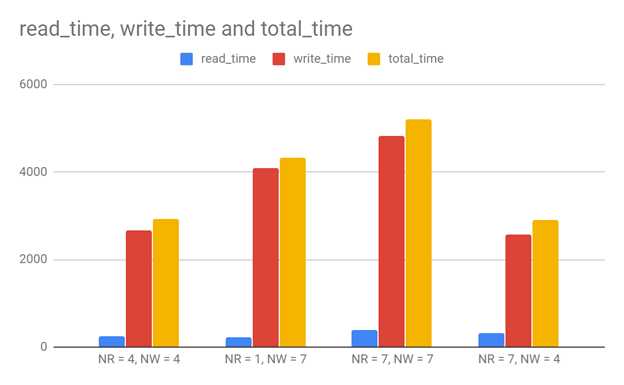
When NR=1, the read time is the shortest. When NW=4, the write time is the shortest. NR=4/NW=4 and NR=7/NW=4 reaches the best performance. Since this is the write heavy case, so minimal NW could get the best performance.
3.4 read heavy (480 read, 160 read for each client, 120 write, 40 write for each client)
1)NR = 4, NW = 4
Client 1, read time: 1114, write time: 781
Client 2, read time: 893, write time: 751
Client 3, read time: 818, write time: 539
2)NR = 1, NW = 7
Client 1, read time: 880, write time: 1252
Client 2, read time: 690, write time: 1028
Client 3, read time: 584, write time: 982
3)NR = 7, NW = 7
Client 1, read time: 1841, write time: 1646
Client 2, read time: 1740, write time: 1697
Client 3, read time: 1929, write time: 2082
4)NR = 7, NW = 4
Client 1, read time: 1205, write time: 729
Client 2, read time: 1233, write time: 876
Client 3, read time: 1503, write time: 1255
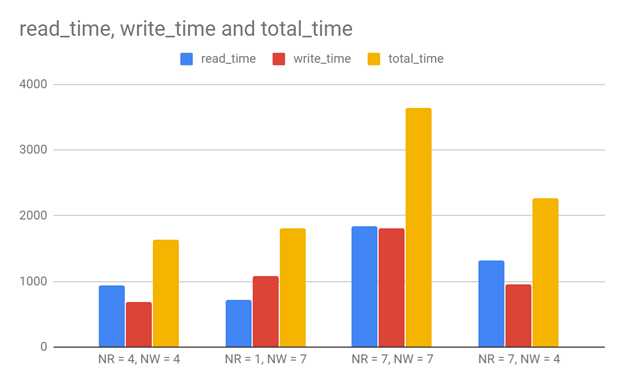
When NR=1, the read time is the shortest. When NW=4, the write time is the shortest. NR=4/NW=4 reaches the best performance. Since this is the read heavy case, so minimal NR could get the best performance.
3.5 Negative cases
We tested the 2 cases:
1. read a remote file, while the file does not exist in remote file system
2. write a local file to remote, while the file does not exist in client
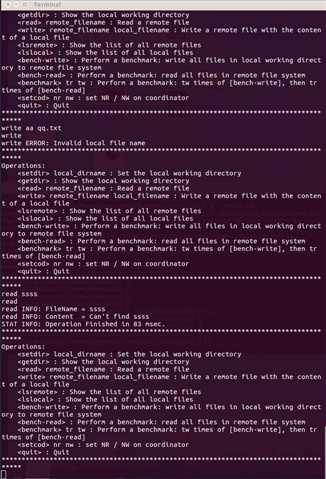
5105 pa3 Distributed File System based on Quorum Protocol
标签:contacts roc ram hash parameter round make ati strong
原文地址:https://www.cnblogs.com/pdev/p/11331871.html